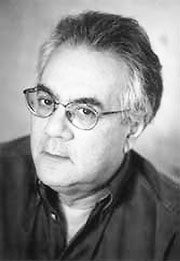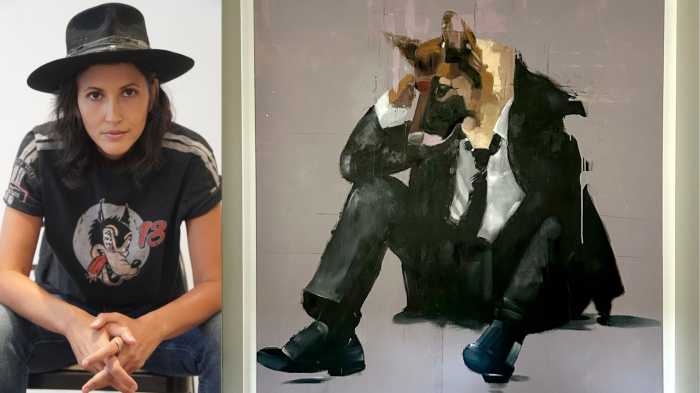By Jerry Tallmer
The Barney Frank you see in “Let’s Get Frank” — the witty, nervy, peacock-proud 12-term Massachusetts congressman exchanging rapier thrusts with Henry Hyde and the massed anti-Clintonian forces of darkness during the asshole 1999 impeachment hearings in the House Judiciary Committee — is very far from the scared, lonely Bayonne, New Jersey, 12-year-old of 47 years earlier, trying to figure out why he gets no charge from the pictures of sexy women the other guys are passing around.
“When I got to be 13, in 1953, it dawned on me that I was gay,” Frank said during a double-interview some days ago that started out (in person) during a Gay Pride party in Manhattan and resumed 40 hours later (by telephone) from San Francisco — a city where, incidentally, the gay-marriage outside-the-law defiance does not meet with his approval.
“There I was, at 13, part of the most detested minority in the world, fully believing I could never tell anybody in the world about it in my life.”
Wasn’t there anybody with whom you could talk?
“No. Absolutely nobody in the whole world. Eventually my siblings” — two sisters, one brother — “figured it out. I must say I was probably unfair to my family.”
Does he remember his first actual sexual experience?
“I don’t discuss that.” Two beats. “I was pretty repressed anyway,” said the congressman, who in “Let’s Get Frank,” Bart Everly’s peppery 75-minute documentary — at Film Forum through July 27 — is about as unrepressed a counter-punching happy warrior as anyone could ever wish for.
“I look back now,” Frank said, “and realize exactly how hated gay people were then, when I was a kid. You have to remember that in 1954 Eisenhower signed an executive order that singled out gay people as security risks… worthless… a threat. Clinton revoked it 40 years later.”
Doesn’t that whole impeachment turmoil seem pretty small potatoes at this remove, five years later?
“Oh yeah, sure. That’s one reason I’m glad Bart’s movie is coming out — people will see what a gnat that was.”
You were pretty good on the attack, Congressman.
“Yes. Well, I really thought it was important to attack. It was all part of that culture war” — at its core, over the centuries, the same one that Stendhal, whose Bill Clinton was a man named Bonaparte, epitomized in “The Charter House of Parma.”
How are things between Clinton and Barney Frank today?
“O.K.” Tiny pause. “Cooled off… He was very grateful at the time. But later I was against those pardons he did.” No, Frank hasn’t yet read “My Life” from Page 1 to Page 900 whatever. “I did check the index,” he says with a half-smile. “Not mentioned.”
How does the representative from Massachusetts’ 4th District feel about Massachusetts Senator John Kerry?
“Oh, very positive. He’s been terrific, in the good sense — a member of that generation of politicians aware of the existence of gays. He was the main sponsor in the Senate of the Gay Rights Bill.”
Thinks a moment — a very brief moment.
“Nobody thought a year ago that you could be for gay marriage and win the presidency. Short of that,” said Frank — i.e., short of coming out for gay marriage — “he’s been very good.”
Are you yourself going to run for senator?
“If the Democrats do not take the House and Kerry wins, I will run for the Senate.” If they do take the House, Barney Frank, much liked even by various of his political opposites, is in line to become chairman of that chamber’s important Financial Services Committee.
Barney Frank was born in Bayonne Hospital, March 31, 1940.
“I’ve put out a new fundraising letter that says: ‘Will you still need me, will you still feed me, now that I’m 64?” He does not look 64 — too boyish for that — boyish, not goyish. There have been times in his life, but not now, when he put on fat.
“Oh yeah, I’m Jewish, I eat. I don’t drink, but I eat. As I put it in two words in the Washington Post: ‘STRESS/ FRESS.’ The last time I gained excess weight was during two tough congressional races, in 1980 and ’82.”
There is a quick shot in the “Let’s Get Frank” documentary — the photo of a younger Barney Frank as a baseball player — that connects to this.
“It was in a softball game in 1982, when [still closeted] I was running against Margaret Heckler, the incumbent, who was sort of implying I was gay. So we made two commercials to show I was I tune with good American values.
“The first was of a lady saying: ‘I know he’ll be a good congressman. You know how I know? He’s my son.’ Which was true, because she was my mother. The second commercial was of me playing baseball and sliding home.
“Yeah, I played baseball as a kid, played softball; and as a congressman — the House Democrats versus the House Republicans — played hardball into my early 40s. In 1984, when I was 44, I couldn’t see and a ball nearly killed me. That’s when I stopped.”
Barney Frank’s mother, Elsie Golush Frank, now 91, her people came from Minsk, is in the Bart Everly documentary, of course, still saying nice things about her son, and so is and does his older sister, Ann Lewis, former director of communications for Bill Clinton. “Guess what her maiden name was.”
Huh? Oh [says a slow-witted journalist], I get it. Anne Frank, only without the “e.”
“And my mother was in the hospital giving birth at the same time as Frank Sinatra’s wife. Not to me, to my younger sister Doris — Doris Breay, an administrator at Brandeis — who is three days younger than Nancy Sinatra. My mother also has a 102-year-old sister, Fanny, who’s still alive.”
The congressman’s fourth and youngest sibling is David, who’s in public relations in Washington.
And then there is — there was — Sam Frank, Barney’s father, whose parents came from Poland. A cousin-in-law was Shemp Allen, one of the original Three Stooges (later replaced by Curly).
Says Sam Frank’s son: “I went to Bayonne High School, and grew up on the New York Post, the old New York Post that used to be a newspaper. Jimmy Cannon. Doris Fleeson, Murray Kempton. I still quote Kempton’s great line: ‘The function of editorial writers is to come down from the hills after the battle is over, and shoot the wounded.’ I like to apply that to corporative boards of directors.”
Frank graduated high school in 1957, went to Harvard (BA 1962) and took a year off from college when his father died.
“He ran a truck stop and gas station and diner and bunkhouse in Jersey City, under the Pulaski Skyway. I used to pump gas there. Not far away was a dumping place for dead bodies.”
Like Jimmy Hoffa?
A shrug indicates: Who knows?
You could fool me, but Barney Frank, on film or in the flesh, seems to speak with a strong Boston accent.
“Well, I’ve lived up there 42 years. They don’t think it’s a Boston accent. They think it’s a New Jersey accent.”
Coming out of high school, out of college, Frank faced the double-whammy of being gay and being Jewish.
“Absolutely a double handicap in politics. So I figured I’d be a professor, an academic, and occasionally go into politics. In 1967 I volunteered to work for Kevin White, who was running for mayor of Boston against a racist [Louise Day Hicks]. It turned out I was better at politics than at academe, and when White won, I went to work for him.”
In 1972, Frank, still deep in the closet, got elected to the Massachusetts state legislature, but didn’t think he could go any farther than that, and because “I was making myself crazy being closeted,” had decided by the late 1970s that by the end of the decade “I would leave politics and just be a lawyer”… and an open homosexual fighting for gay rights.
But then came what he refers to, roguishly, as “divine intervention.” In 1980, Pope John Paul, who didn’t want any Roman Catholic priests serving in the U.S. Congress, forced ultra-liberal Father Robert Drinan to retire — leaving a vacancy in Massachusetts, a vacuum that who other than Barney Frank could fill best?
“I called my brother-in-law Jim and said: ‘You just heard the closet door slam. I’m running for Congress.’”
By the early 1980s, Frank says in the Bart Everly film, he was coming out “in a half-assed way,” and over the phone from San Francisco he says now: “For the next six years I did that, but I was miserable,” particularly under the harsh irony of “celebrating all these gay-rights events but denying myself some of those rights.”
In 1987 he decided to come out all the way. He went to a great man named Tip O’Neill, Democrat, Massachusetts, Speaker of the House of Representatives, and said: “It’s true, Tip, I’m coming out.”
O’Neill put his arm around Barney Frank. “I’m sorry to hear that,” he said. The younger man asked: “Why?” “Because,” said Tip O’Neill, “I thought you were going to be the first Jewish Speaker.”
Two years later, the roof fell in. A male prostitute named Steve Gobie — whose services Frank had enjoyed, for a fee — passed around the lie that Frank’s Washington, D.C., apartment had been put to use as a gay whorehouse, with Barney as the, so to speak, madam. Frank had to survive, and did survive, a Congressional reprimand that seasoned him for the Clinton impeachment proceedings 10 years later.
To rake over those old coals here would be tedious, and as Frank nicely puts it in the documentary, “By the time one of these things [scandals] gets to the climax, you’re kind of bored . . . [In politics, as in life] you can afford to be bored, but not boring.”
In the film we see a few glimpses — on the porch of a house at The Pines, Fire Island, and once or twice elsewhere — of Barney Frank and a handsome younger man named Sergio Pombo. Sergio and Barney have been together since they met at a gym in October 1998 — “though we actually once met at a dinner party years earlier.”
Pombo is 40. He’s from Barranquilla, Colombia, speaks seven languages and works for the World Bank. What with the traveling each of them do, they’re together in the same city, Frank estimates, “60 percent of the time.”
Barney Frank is, as noted, against what’s been happening in San Francisco, where a flood of gay marriages took place in defiance of the law.
“I’m for gay marriages,” he says, “but I thought this was a civil disobedience that did more harm than good. And nobody GOT married. I think they’ll eventually all be held invalid. It was civil disobedience without any real gains.”
In Massachusetts, however, thanks to that state’s highest court, “those marriages are and will be valid.”
Say, congressman, are you and Sergio going to get married?
“We don’t discuss it.” Short pause. “Publicly.”
Which may be considered one of the few times you will ever find Barney Frank at a loss for words.
“LET’S GET FRANK.” Produced and directed by Bart Everly. A Random production. Executive producer: Jonathan Van Meter. Music by The Angel. Edited by David Dawkins. 75 minutes. July 14-27 at Film Forum, 209 W. Houston St., 212-727-8110.
For More: https://www.amny.com/news/free-shakespeare-in-the-park-2/







































